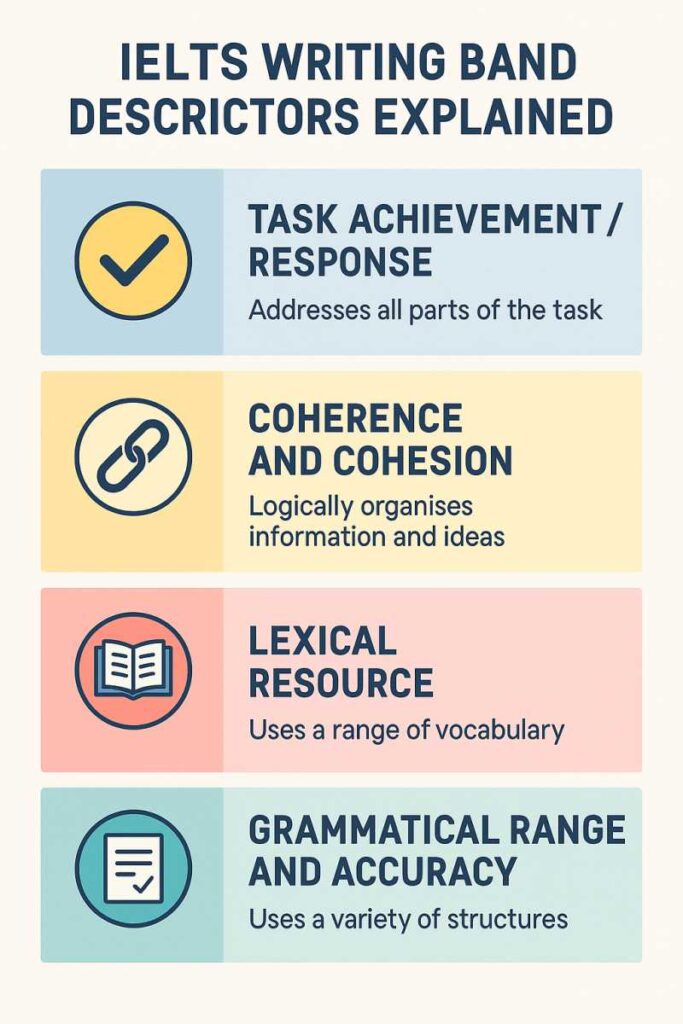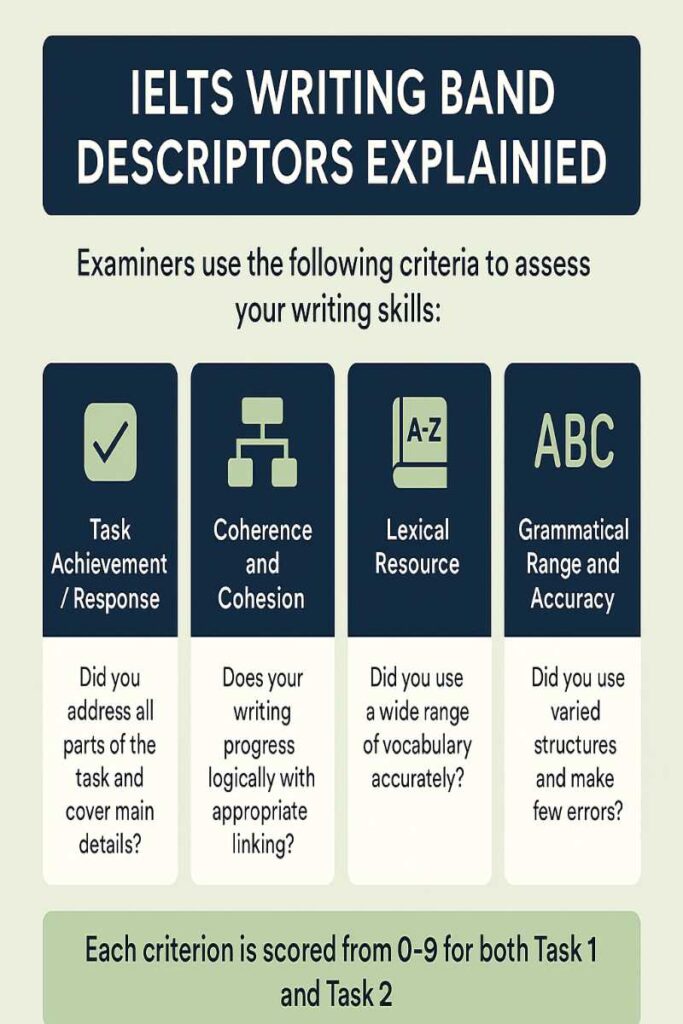Have you ever written an IELTS essay and thought it was great, but the score was low? Of course, that’s because the IELTS Writing test uses strict band descriptions to grade your writing in certain areas.
This post can help you:
Learn how to use the official IELTS Writing band descriptions
Find out what each band level means, especially levels 6 through 8
Explain how the inspectors rate Tasks 1 and 2
How to make your work better so it meets the requirements for a grade
Let’s talk about what IELTS test takers really want to see.

What Do the IELTS Writing Band Descriptors Mean?
Officially, band descriptors are what IELTS judges use to decide how to score a test. They are the same for both Task 1 and Task 2, but there are some differences between the tasks.
These four things are very important and each count for 25 percent of your score:
- Task Completion (Task 1) / Task Answer (Task 2)
- Sense and cohesion
- Lexical Resource (Word List)
- Range and accuracy of grammar
Each one gets a score between 0 and 9. The last band is the middle one of the four.
Criteria 1: Task Achievement (TA) – Task 1
Task Achievement checks to see if you:
- Make a list of the most important parts of the graph, table, chart, or process
- Don’t leave out any important parts of the job; cover them all
- Do not give your view (Academic Task 1 is factual)
- Type at least 150 words
Band 7: Includes all important parts
- A clear picture
- Effective comparisons of data
- Small mistakes are okay
Band 8: The job is fully completed
- Brings out all the important similarities and trends
- Descriptions that are accurate and well-supported
Tip: Don’t list each number; instead, group them together and focus on the trends.
One of the criteria is a Task Response (TR) for Task 2 criteria.
Task Response checks to see if you:
- Complete the whole writing question
- Give your clear view (if asked)
- Use appropriate examples to back up your claims
- Type at least 250 words
Band 7: Takes care of the whole job
- Position was clear the whole time
- Backs up ideas, but there may be a mismatch
Band 8: Talks to all parts fully
- Gives well-thought-out, useful ideas
- No content that isn’t useful or repetition
Do not stray from the subject. Keep your answer to the question and back up every idea.

The second criterion is Coherence and Cohesion (CC).
This checks how well and clearly your ideas fit together.
What examiners look for:
- Sentence arrangement that makes sense
- Clear words with topics
- Use of connecting words and devices that hold things together (for example, but, additionally)
- Overall how the ideas flow and move forward
Band 7: Clear flow of ideas
- Writing paragraphs makes sense
- Utilises a variety of connecting tools; some mistakes are acceptable
Band 8: Ease of flow of thoughts
- Use of cohesive devices with skill
- Using paragraphs makes things clearer
Use of linked words like “moreover,” “in addition,” and “furthermore” in every sentence is not a good habit.
Third Criterion: Lexical Resource (LR)
This is about how big, correct, and suitable your vocabulary is.
Examiners look at:
- Number of words used
- Using words that aren’t used very often or that are academic
- Spelling and making words
- Ability to stay away from repetition
Band 7: The right words for the job
- Sometimes mistakes with word choice or collocations
- A sense of style and the ability to be flexible
Band 8: Lots of words to choose from
- Words are rarely repeated
- Uses uncommon words and sentences with skill
Tip: Be creative with how you use buzzwords and topic-specific words.
Fourth Requirement Is for Grammatical Range and Accuracy (GRA)
This tests how well you can use a range of grammar structures.
What examiners look for:
- Types of sentence organisation (simple, compound, and complex)
- Correct tense
- Agreement of subject and word
- How to use modals, conditionals, passive voice, and other words
Band 7: Uses a range of structures
- Some mistakes, but the message is still the same
- Generally correct
Band 8: A lot of different complicated structures
- Mostly free of errors
- Having control over grammar and phrasing
Don’t play it safe by using only simple words; show range by being accurate.
How to Figure Out Your IELTS Score
Let’s say these are your marks for Task 2:
- Task Response: 8.0
- Coherence and Cohesion: 7.0
- Lexical Resource: 7.0
- Grammar Range and Accuracy: 7.0
Score for the band as a whole:
(8 + 7 + 7 + 7) ÷ 4 = 7.25 – Rounded down to 7.0
Tip: To get a Band 8, you need to get at least 7.5 on all of the categories.
The Band Comparison Table for Task 2 Is Shown Below
| Band | Task Response | Coherence | Word List | Grammar |
| 6 | Does the job, but might leave out some details or stray off-topic | Some coherence, and too many basic links | Not very flexible, and some repeats | Small range, lots of mistakes |
| 7 | Gives all parts a clear place to go | Logical development with some errors in the cohesive device | Some unusual words and small mistakes | Good range with not many mistakes that can be seen |
| 8 | Fully develops useful ideas with strong backing | Smooth flow, and using paragraphs to make things clearer | Use of a lot of different collocations correctly | Large range with few mistakes |
What You Can Do to Get Better at Each Band Descriptor
- Answer to the task: Carefully look over the question and figure out what kind it is (opinion, talk, problem-solution)
- Plan your essay before you start writing it
- Give full examples for each idea
- To make your writing more logical and smooth, use clear paragraphing (one idea per paragraph)
- Switch between words, but don’t use too many
- Use references (like “this trend” or “such changes”) to link ideas in a way that makes sense
- Lexical Resource: Make word lists based on topics
- Learn academic words that mean the same thing, like “important” → “crucial” and “significant”
- To avoid repeating yourself, paraphrase
- Grammar Range: Write in various tenses to improve your skills
- Active and passive voice should both be used
- When it makes sense, use conditionals, modals, and relative sentences
Sample Essay Snippet with Features That Get a Band 8 and Above
Prompt: Some people think that learning online is better than learning in a classroom. Should I agree or not
Band 8 Sample:
While traditional classrooms offer structure and the chance to connect with other students, I think that online education is more flexible and open to more people. Virtual learning systems, in particular, let students study at their own pace, which is great for people who have to work or take care of their families.
- Task Response: The position is clear and stated
- Coherence: The points fit together logically
- Words used: “flexibility,” “accessibility,” “virtual platforms”
- Grammar: Includes a complex sentence with “which is especially beneficial”
Resources to Help You Understand Band Descriptors
| Resource | What It Gives You |
| IELTS.org | Band descriptions in PDF – the official version of writing scoring guides |
| IELTS Liz | Video descriptions of band scores in great detail |
| Cambridge IELTS | Example answers with feedback from the examiner |
| IELTS Advantage | Strategy tips based on band scores |
| IELTS David | List of high-scoring examples of essays |
Mistakes You Often Make That Bring Down Your Band
- Not giving a full answer → Leaving out the second part of a two-question writing
- Word repetition → Using “important” five times when there are other words that mean the same thing
- Linking words that are used too much → “Furthermore” and “moreover” are not needed in every line
- Using templates too strictly → Your work sounds robotic
- Grammar mistakes that change meaning → “Students was tired” instead of “Students were tired”
Thoughts for Now
The first thing you can do to improve your IELTS Writing score is to understand the band descriptions. You can work on your weaknesses and really improve if you match your practice with these scoring factors, especially Task Response, Coherence, Vocabulary, and Grammar.
Don’t forget that the IELTS isn’t just about writing well; it’s also about writing the way the tester wants you to.
Call to Action
How hard is it for you to describe this band
Leave a comment below, and we’ll make practice problems just for that skill
Also, if you sign up, you’ll get our library of Band 8 essays and weekly language tests

About the AuthorWelcome to TechIELTS. I’m Md. Jahangir Alam, an experienced engineer with over 15 years in electrical and automation systems. Alongside my engineering career, I’ve developed a strong interest in English language learning and IELTS preparation.
I hold a Duolingo English Test score of 135 (IELTS 7.5 equivalent) and am currently pursuing an M.Sc. in Cyber Security from Royal Holloway, University of London. I use my technical background to create clear, structured IELTS learning materials for students and professionals.
👉 Connect on LinkedIn
